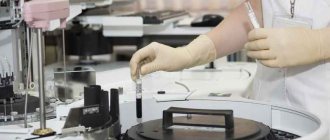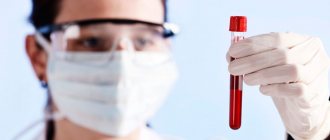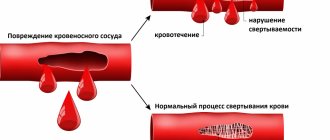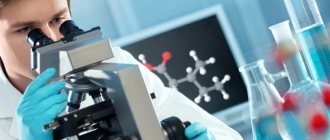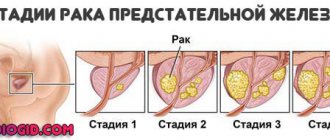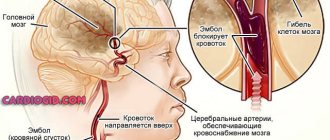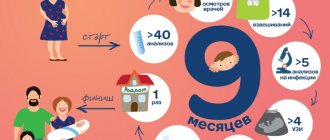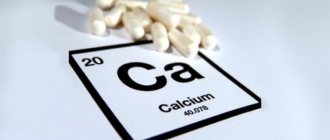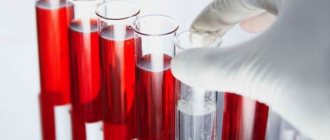Creatine kinase (CK) is an enzyme found in the heart, brain, skeletal muscle and other tissues.
It is also present in small quantities in the blood. An increase in creatine kinase in the blood indicates muscle damage due to physical activity, injury or pathological processes.
The causes of increased creatine kinase in the blood can be myopathies, muscular dystrophy, rhabdomyolysis - accelerated breakdown of muscle tissue. In this disease, the increase in CPK levels will be especially significant. Intoxication, taking certain medications (statins) and drugs can also lead to damage to muscle fibers. During myocardial infarction, CK in the blood also increases, and for a long time a blood test for creatine kinase was one of the main diagnostic markers, but currently a more specific marker is used to diagnose a heart attack - a troponin test. CPK analysis for suspected heart attack is now used as an auxiliary test.
What do the test results mean?
An increase in total creatine kinase is observed with myocardial infarction, increased physical activity, trauma and burns, myocarditis and myocardial dystrophy, Duchenne myopathy, poliomyelitis, muscular dystrophies, tumor decay, taking statins, dexamethasone, NSAIDs, drugs, after surgical operations.
A decrease in CPK levels may indicate alcoholic liver damage, loss of muscle mass, pregnancy, rheumatoid arthritis, hyperthyroidism, or taking certain medications (vitamin C, amikacin, aspirin). It should be remembered that the CPK test is not specific enough for the diagnosis of myocardial infarction and other pathologies, therefore, in case of deviations from the norm, additional studies must be carried out.
When is the test prescribed?
CPK is found in skeletal muscle, smooth muscle, heart and brain. Therefore, if an increased result is obtained, serious diseases such as myocardial infarction, chronic muscle diseases and even oncology can be suspected.
Creatine phosphokinase (CPK) - 250 rub.
Urgent analysis - 500 rub.
Deadlines
Normal – 1 day.
Urgent – 1.5 – 2 hours.
Taking blood from a vein is paid separately - 300 rubles.
(If several tests are performed simultaneously, the service for collecting biomaterial is paid once)
Indications
- Comprehensive diagnosis of diseases associated with muscle cell damage.
- To confirm myocardial infarction and during the recovery period to assess the condition of the heart muscle.
- If oncology is suspected as part of a comprehensive diagnosis and to assess the effectiveness of treatment.
- To assess the severity of muscle injury.
To obtain an accurate result, you must strictly follow the preparation tips. Laboratory equipment is no less important, so it is recommended to contact only those clinics that are equipped with modern equipment.
Material for analysis
venous blood serum (avoid hemolysis)
Preparing for the study
As a rule, before taking the analysis you need to do the following:
- Tell your doctor about the medications you are taking; they may need to be stopped temporarily. If it is impossible to cancel, then you need to donate blood before taking the medicine in the morning.
- Avoid eating 8 hours before blood sampling. Therefore, it is best to take the test in the morning, on an empty stomach.
- The day before blood sampling, you must avoid fatty, fried, spicy and salty foods. Alcohol and kvass are strictly excluded.
- It is worth telling your doctor about a recent ultrasound or x-ray. These examinations may affect the results.
- It is important to avoid intense physical activity - after exercise, muscle cells are damaged, which leads to an increase in enzyme levels. This may make it difficult for your doctor to interpret the results.
- It is recommended to avoid emotional stress before donating blood.
Creatine kinase (Creatine phosphokinase CPK)
Creatine kinase is an enzyme that stimulates the conversion of creatine into creatine phosphate and provides energy for muscle contraction.
Research method
UV kinetic test.
Units
U/L (unit per liter).
What biomaterial can be used for research?
Venous blood.
How to properly prepare for research?
- Do not eat for 12 hours before the test.
- Avoid physical and emotional stress for 30 minutes before the test.
- Do not smoke for 30 minutes before donating blood.
General information about the study
Creatine kinase is an enzyme that catalyzes the transfer of a phosphoryl residue from ATP to creatine to form creatine phosphate and ADP. The reaction, catalyzed by creatine kinase, provides energy for muscle contraction. There are creatine kinase contained in the mitochondria and cytoplasm of cells.
The creatine kinase molecule consists of two parts, which can be represented by one of two subunits: M, from the English muscle, and B, brain. Thus, in the human body creatine kinase exists in the form of three isomers: MM, MB, BB. The MM isomer is found in skeletal muscles and myocardium, MV - mainly in the myocardium, BB - in brain tissue, and in small quantities in any cells of the body.
In the blood of a healthy person, creatine kinase is present in small quantities, mainly in the form of the MM isomer. Creatine kinase activity varies with age, gender, race, muscle mass, and physical activity.
Creatine kinase enters the bloodstream in large quantities when the cells containing it are damaged. At the same time, based on the increase in the activity of certain isomers, one can conclude which tissue is affected: MM fraction – muscle damage and, to a lesser extent, heart damage, MV fraction – myocardial damage, BB fraction – cancer. Typically, tests are done for total creatine kinase and its MB fractions.
Thus, an increase in creatine kinase in the blood allows us to draw a conclusion about a tumor process, damage to the heart or muscles, which in turn can develop both with primary damage to these organs (during ischemia, inflammation, trauma, degenerative processes), and as a result of their damage during other conditions.
Muscle diseases in which cells are destroyed are myositis, myodystrophy, injuries, especially when compressed, bedsores, tumors, intense muscle work, including what occurs during convulsions. In addition, there was an inverse relationship between the levels of thyroid hormones and creatine kinase: with a decrease in T3 and T4, the activity of creatine kinase increases and vice versa.
When is the study scheduled?
- For symptoms of coronary heart disease.
- With symptoms of myocardial infarction, in particular with a blurred clinical picture, especially with a recurrent infarction, atypical localization, pain or ECG signs, difficulty in differential diagnosis with other forms of coronary heart disease.
- For hypothyroidism.
- For symptoms of myositis, myodystrophy, myopathy.
- When planning pregnancy by a woman whose family had Duchenne myopathy patients.
- For diseases that can lead to damage to the heart or muscular system.
What do the results mean?
| Gender/age | Reference values |
| Male/ > 17 years old | |
| Female/ > 17 years old |
The results of the analysis indicate the presence or absence of damage to the myocardium, skeletal muscles, tumor process, and thyroid diseases. The correct interpretation of the obtained indicators allows us to draw a conclusion about the form of the lesion and the degree of its severity.
Reasons for increased total creatine kinase activity:
- myocardial infarction,
- myocarditis,
- myocardial dystrophy,
- polymyositis,
- dermatomyositis,
- muscular dystrophy,
- injuries, burns,
- hypothyroidism,
- tumor process in the body,
- tumor disintegration,
- taking dexamethasone, statins, fibrates, amphotericin B, painkillers, alcohol, cocaine,
- intense physical activity,
- seizures, status epilepticus,
- surgical interventions.
Reasons for decreased activity of total creatine kinase:
- decrease in muscle mass,
- alcoholic liver damage,
- collagenoses (for example, rheumatoid arthritis),
- hyperthyroidism,
- taking ascorbic acid, amikacin, aspirin,
- pregnancy.
Reference values:
Units of measurement in CELT: units/l, norm 32-294 units/l
The range of the norm depends on the patient’s age and gender.
It is important to remember that self-diagnosis is unacceptable. The information below is for your reference only. A deviation from the norm does not necessarily indicate the presence of a disease - the results of other studies, as well as the overall clinical picture, must be taken into account.
At the age of up to 5 days, the enzyme level is up to 650. By 6 months, the maximum threshold decreases to 300, by 1 year of life - to 200. In the period up to three years, the maximum can be 230, up to 6 years - 150.
For women, the norm is up to 150 at the age of 12 years, up to 120 at the age of 17 years and up to 170 at the age of 17 years or more. For men, the values are 250, 270 and 190, respectively.
What to do if your child’s creatinine level changes
To return creatinine in children to normal limits, it is necessary to determine the root cause of changes in indicators: poor nutrition, low or overweight, exhaustion, chronic diseases, shock, lack of protein in the body, blockage of the urinary tract, etc. If creatinine in children has changed not due to For serious illnesses, you need to reconsider your diet. When nitrogen compounds in the blood increase, it is recommended to increase the amount of fresh fruits and vegetables. For boys and girls with low body weight, parents should encourage weight lifting. Along with it, creatinine in children rises to normal levels.
When to see a doctor
Changed creatinine in the blood of children indicates pathological conditions of the body. Pediatricians of JSC "Medicine" (clinic of academician Roitberg) in the Central Administrative District are ready to help if the following symptoms appear: constant fatigue and fatigue, shallow difficulty breathing, disturbances of consciousness, pain in the heart, failure of the intestines. You need to sign up for an examination after being injured or in a state of shock. If creatinine is low in a child’s blood, no significant symptoms appear. If necessary, the pediatrician will refer you to specialists to prescribe treatment. An increase to 200 µmol/l poses a danger to health and life. In this case, you need to urgently undergo dialysis. This development of the situation is possible with kidney failure.
Diagnostics of blood parameters
Biochemical analysis is the main diagnostic method that shows creatinine in the blood and whether the norm in children is maintained or not. Laboratory tests check creatinine to nitrogen ratios and creatinine clearance. For the second analysis, an additional 24-hour urine sample is taken. For creatinine, the norm in children can vary +/- 15%. This is not an indicator of pathology. We can talk about its presence when there are sharp jumps in indicators to high numbers. 48 hours before the analysis, it is not recommended to consume meat and protein products in order to avoid correlation of analysis parameters. If your child plays sports, eliminate physical activity one day before.
Increased creatinine levels
If creatinine is elevated in a child’s blood, this indicates a violation of the excretory system. Excessive accumulation of substance occurs. At sharp and high levels it can have a toxic effect. Nitrogenous substances are excreted from the body in urine. They should not linger because they are decay products. If the analysis shows that creatinine is elevated in a child, regardless of age, you need to look for the causes and place of development of the pathological process. Possible options:
- renal failure;
- thyroid diseases;
- liver dysfunction;
- adrenal hyperfunction;
- consequences of severe injuries, infections;
- history of intestinal obstruction;
- dehydration of the body;
- pathology of connective tissue, etc.
How to make an appointment with a pediatrician
Examination of children, collection of anamnesis and prescription of tests is performed by the pediatrician of JSC "Medicine" (clinic of academician Roitberg). You can figure out why your child’s creatinine is low or high, and you can examine the current state of health at an appointment by making an appointment by phone: +7 (495) 995-00-33. The clinic is located at the address: Moscow, 2nd Tverskoy-Yamskaya lane, building 10. This is the center of Moscow, so there are many metro stations nearby: Mayakovskaya, Chekhovskaya, Tverskaya, Belorusskaya, Novoslobodskaya. If you wish, you can make an appointment on the website of JSC “Medicine” by filling out the “Make an appointment with a doctor” form. You must provide your contact phone number and name. After this, a call will be received from the clinic to coordinate the date and time of the appointment.
